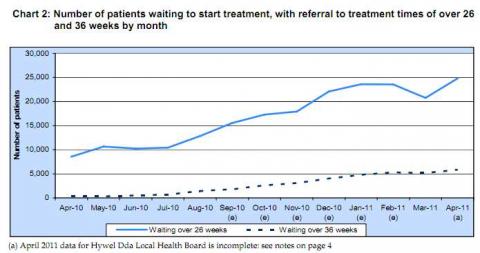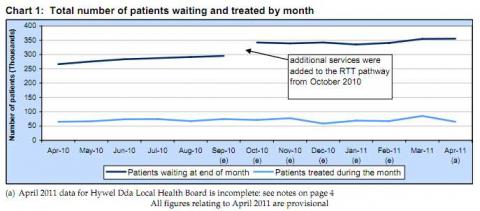Is Labour responsible for rising NHS waiting times and falling budgets in Wales?
"If the right hon. Gentleman wants to look at what is happening in the NHS, Wales is now only one part of the country that is controlled by Labour and there waiting lists are massively up and health spending is being cut. That is what Labour would do to the NHS." David Cameron, Prime Minister's Questions, 8 June 2011
The question of whether or not NHS waiting times are rising under the Coalition's watch has been one which David Cameron and his opposite number Ed Miliband have unable to agree in recent weeks. While Labour have consistently argued that month-on-month data has pointed to un upward trend since May last year, Health Secretary Andrew Lansley has claimed they are "stable".
The issue formed one half of a two-pronged attack from the Labour Leader at yesterday's PMQs (the other being sentence reductions for guilty pleas, which we looked at yesterday). However Mr Cameron hit back by claiming that Mr Miliband's party had itself set a poor example in Government in Wales, where waiting times were "massively up".
So should Labour set its own house in order in Wales before it campaigns on waiting times in Westminster?
As in England, the Welsh NHS records 'referral to treatment' times against targets, although these differ on either side of the border. While the English NHS measures the speed of treatment against an 18 week waiting time target, in Wales a 26 week benchmark is used, meaning that the two measures shouldn't be directly compared. Unlike in England, the Welsh Assembly Government does not record a median waiting time, although data is broken down into groups by length of time.
Looking at this data, Mr Cameron does seem to be correct in identifying an upward trend in waiting times over the past year in Wales. As the graph below shows, in April 2010 just under 9,000 people had waited more than 26 weeks to receive treatment, while in April of this year this had risen to nearly 25,000.

This rise is also reflected in the numbers of people on the waiting lists. Between March 2010 and 2011 the number of people waiting for treatment in Wales rose from 247,627 to 345,554.
This is undoubtedly a sharp rise, however there are nevertheless some caveats of which we should be aware.
Most importantly, it needs to be stressed that there are comparability issues in the data. In October 2010, the Welsh Assembly Government changed the types of treatments included in these statistics, adding nearly 50,000 extra cases to the data.

However even if we consider the data separately, upward trends are evident between both April and October 2010 and in the months since then. So while waiting lists do seem to have lengthened in Wales, they may not have done so to quite the degree that it at first appears.
When it comes to the other accusation levelled by the Prime Minister — that "health spending is being cut" across the Severn — the case is more clear cut.
The Welsh Assembly Government's Budget, which was finalised in February, sets out that there will be small increases to the £6 billion Welsh healthcare budget of between £17-£18 million over the next three years.
However while there may be a small cash increase, in real terms (once inflation has been accounted for) this amounts to a cut of around 21 per cent over the three years.
On both issues, it is worth noting that the information to which the Prime Minister is pointing dates from before last Month's Assembly elections, and hence from when the Government was led by a Labour-Plaid Cymru Coalition. Whether it is fair therefore to claim that this indicates "what Labour would do to the NHS" is a contentious point.
However what isn't contentious is that the dual trends identified by David Cameron in Wales — lengthening waiting lists and declining budgets — are both backed by solid evidence.